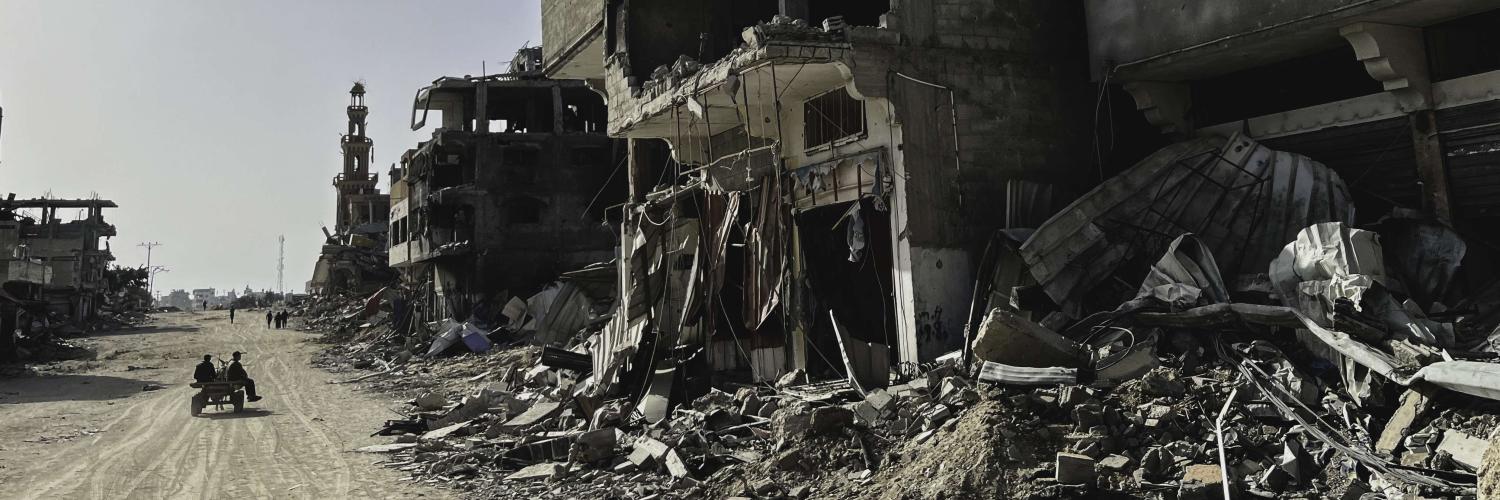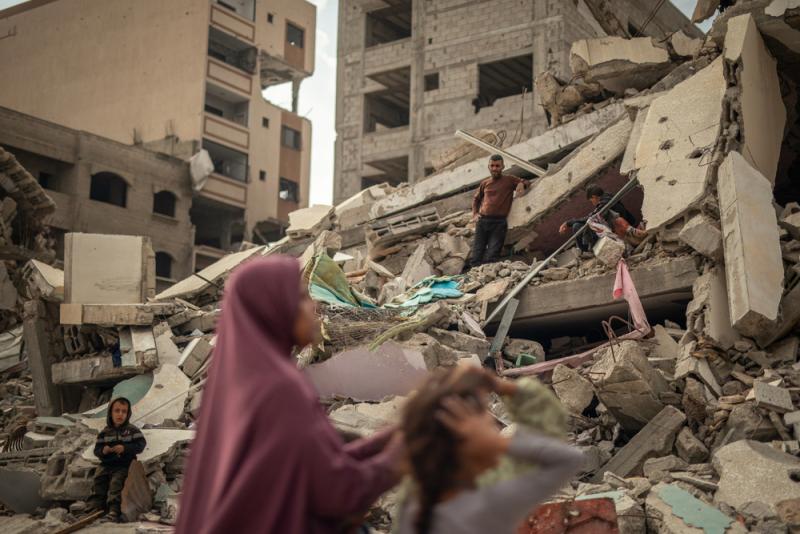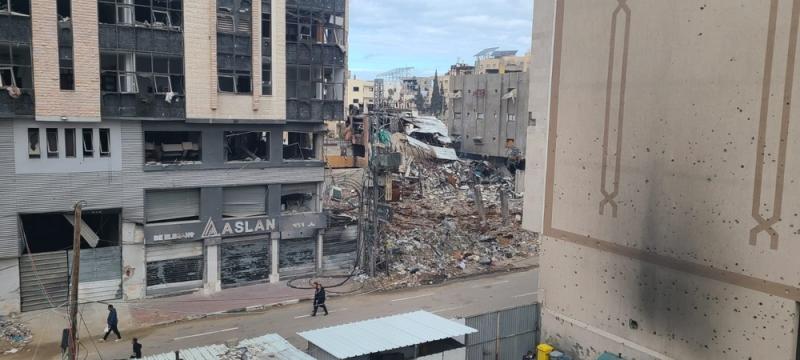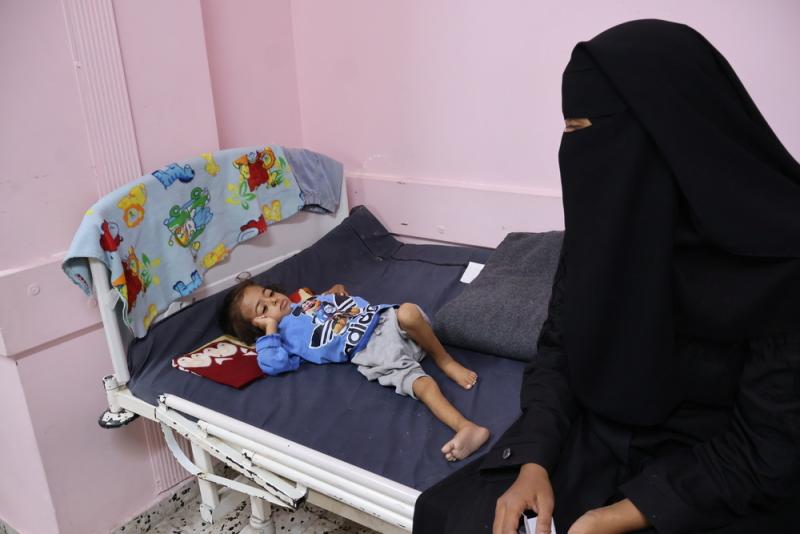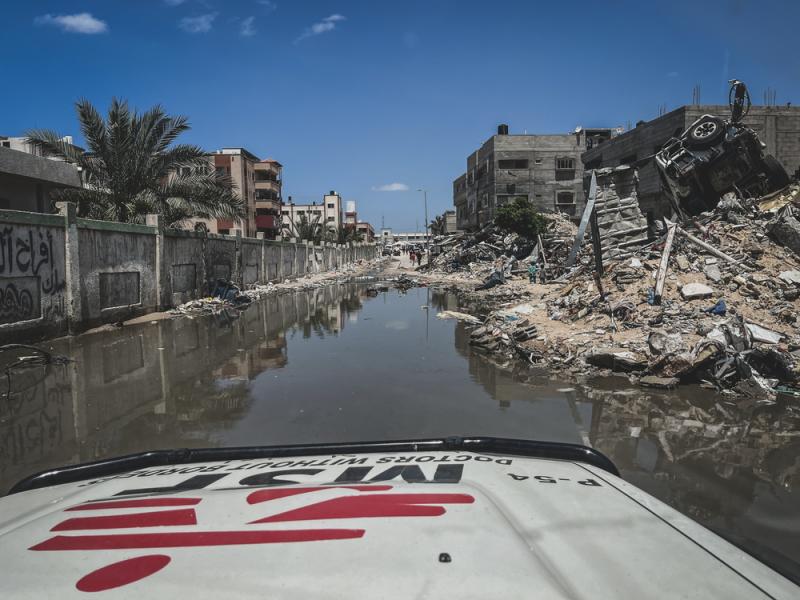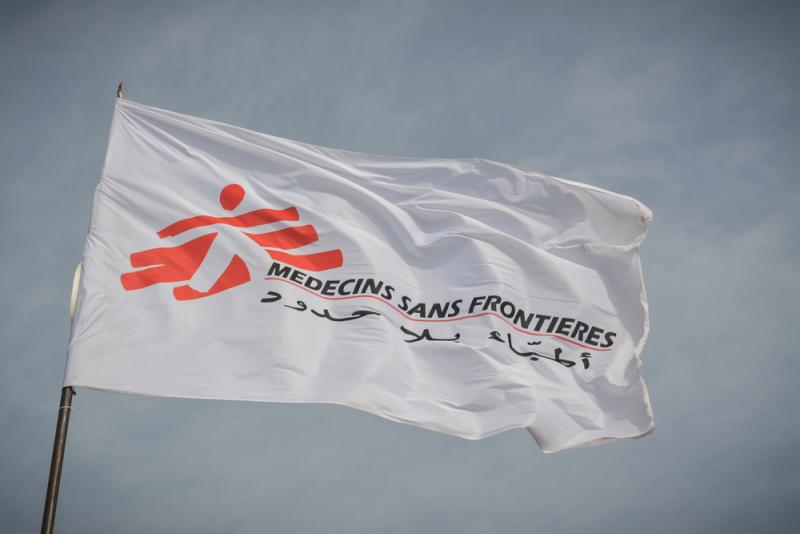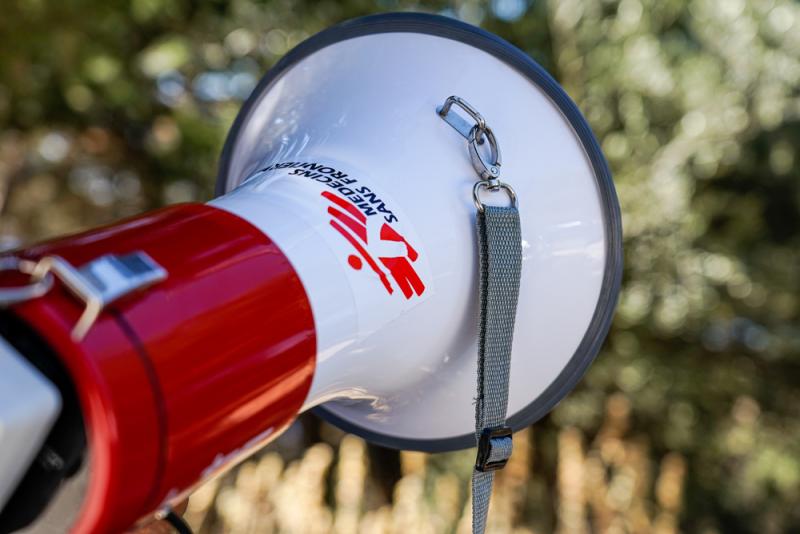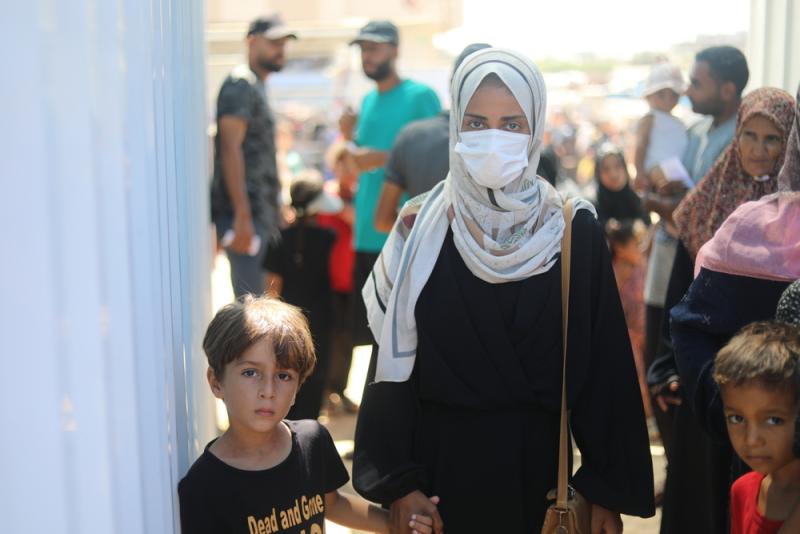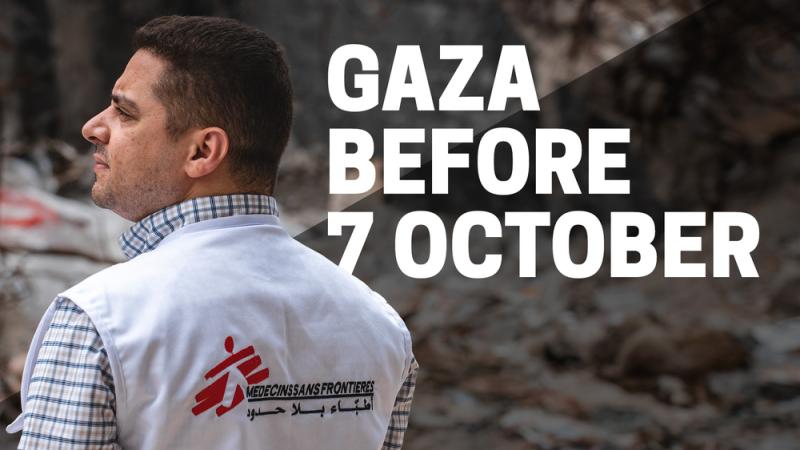A ceasefire in Gaza is essential to bringing much-needed relief to those affected
The announcement of a possible ceasefire, though yet to be signed and implemented, offers a vital respite but comes tragically late—after immense suffering and countless lives lost. While awaiting its implementation, we urge for this fragile relief to serve as more than a pause, enabling people to rebuild their lives, reclaim their dignity, and mourn those lost and all that has been taken from them.
This announcement brings hope amidst the catastrophic situation faced by the people of Gaza. Our staff shares their feelings.
Aysha, Doctors Without Borders Infection Prevention and Control Supervisor
“The ceasefire news was like a shock, our hearts almost stopped of happiness. Finally, we will go back to our houses, the situation will be stable. We will not hear the sounds of the bombings, we will not drive the car very fast assuming that the missile is falling on us, the falling missile is not on us: these things we have been living for the past one year and a half. This is the safety that we are waiting for.”
My children, she was 2 years old, and my son was 4 months old, he does not know what a home means They only know the tent and the feeling to be in the tent; they do not know the safety feeling of a home; they do not know the feeling of having a toy.Aysha, IPC Supervisor
Abu Abed, Doctors Without Borders Deputy Medical Coordinator
"At one point I wanted to smile and laugh and sing and at the same time to cry, to grieve. We will cry about a lot of things when the ceasefire will be starting. We will cry on the people that we lost, friends, family members. We will cry on for the orphans. We will cry for the widows in Gaza. We will cry for the disabled people. We will cry for the houses that have been destroyed and homes that have been destroyed.”
At least the ceasefire, I mean, will stop the blood, will stop the killing, will stop the injured because every minute in Gaza since the last 400 days, it's just blood. You know, the war didn't kill only bodies, it tears apart your soul and hope and leaves behind you a kind of silence that screams pain.Abu Abed, Deputy Medical Coordinator
Israel’s bombing must stop, and a massive, urgent scale-up of humanitarian aid is essential to address the catastrophic humanitarian and medical needs of the people. While the ceasefire must be respected and sustained, it is only the first step in tackling the overwhelming humanitarian, psychological, and medical crisis in Gaza. We urge all parties to ensure that humanitarian aid reaches people across the Strip without delay.
Situation in Gaza
The escalation of violence broke out in Gaza and Israel on 7 October. This has led to heavy Israeli bombardment and indiscriminate attacks, leaving thousands of people injured, and many killed. More than 2.2 million people are currently trapped in Gaza and grave humanitarian need.
Over 1.9 million – over 85 per cent – of the entire population in Gaza had to flee their homes according to OCHA, with half of all displaced people crammed in the south in appalling conditions: they live in temporary structures made of a few pieces of wood banged together and covered in plastic sheeting. Many people sleep in the streets or in the open areas. They struggle to find enough water to meet their hygiene needs.
Will you support our emergency response work?
Help us provide lifesaving medical care during emergencies by making a donation today.
On March 25, the UN Security Council finally stepped up, ordering an immediate ceasefire in Gaza. This resolution was not implemented.
Israeli forces continue to carry out widespread attacks disproportionately impacting civilians. Palestinians in Gaza are suffering every day from an all-out destructive military campaign that blatantly ignores the rules of war.
Without an immediate and sustained ceasefire, and the entrance of meaningful humanitarian assistance, we will continue to see more people die.
On May 24, the ICJ ordered Israel to halt its offensive on Rafah in southern Gaza and to reopen the Rafah crossing. It is another confirmation of how catastrophic the situation is and of the desperate need for humanitarian aid to be scaled up immediately.
Since the beginning of this war, Doctors Without Borders has seen a pattern of attacks against medical facilities and civilian infrastructure. The health system in Gaza is being dismantled just as the needs are exploding, with devastating consequences for Palestinian people. Each medical centre or humanitarian delivery system has been or is being destroyed, to be replaced by less effective, improvised options.
- Attack on Doctors Without Borders-supported hospitals
The health system in Gaza is also under attack. Between 7 October and 9 December, 286 healthcare workers were killed in the Gaza Strip, 57 ambulances were hit and damaged.
7 October: Airstrike very close to Indonesian and An-Nasser hospitals. Both were supported by Doctors Without Borders.
10 October: An outpatient department at Doctors Without Borders Gaza clinic was damaged in an Israeli airstrike. The entrance of the dressing room and sedation room caved in, and windows were shattered.
11 October: Airstrike very close to Al-Awda hospital in north Gaza, where Doctors Without Borders has been operating since 2018. The blast caused damage to the hospital, but the hospital continued to function.
13 October: Israeli forces gave just two hours to evacuate Doctors Without Borders-supported Al-Awda hospital. The hospital was not hit however, there was a sustained bombing close to the hospital as medical staff worked to refer patients to other hospitals. The hospital was damaged again in this further bombing.
30 October: Doctors Without Borders-supported Turkish-Palestinian Friendship hospital in Gaza was hit by a projectile, causing serious damage to the third floor of the building. The hospital stopped completely to function when it ran out of fuel on 1 November. It was the only public hospital with an oncology ward in the Gaza Strip.
3 November: An ambulance was directly hit and destroyed outside Al-Shifa hospital, resulting in the death of many.
Since 10 November: Multiple and repeated attacks on various hospitals have been reported and/or witnessed by Doctors Without Borders staff in northern Gaza, including on the biggest medical complex, Al-Shifa hospital.
18 November: Doctors Without Borders evacuation convoy from Al-Shifa hospital was fired on, killing two people in what appeared to be a deliberate attack by Israeli forces on identified Doctors Without Borders cars.
20 November: Doctors Without Borders clinic in Gaza city was damaged by the Israeli forces, which was preceded by deliberate destruction of our cars by Israeli heavy military vehicles.
21 November: A strike hit Al-Awda hospital. In this attack, two of our doctors, Dr. Mahmoud Abu Nujaila and Dr. Ahmad Al Sahar, and another doctor, Dr. Ziad Al-Tatari, were killed.
24 November: A minibus sent from the south of Gaza for another evacuation attempt of Doctors Without Borders staff and their relatives was destroyed by the Israeli forces.
1 December: Just hours after the truce ended, a blast damaged Al-Awda hospital.
5 December: Al-Awda hospital is facing a total siege. They cannot move, and there are snipers surrounding the hospital. In the days following the commencement of this siege, two members of medical staff at the hospital were shot and killed.
11 December: A Doctors Without Borders surgeon was injured inside Al-Awda hospital by a shot fired from outside the facility. Our colleagues report snipers surrounding the hospital, firing on those inside. Al-Awda hospital has been under total siege by Israeli forces since 5 December.
17 December: Israeli forces take control of Al-Awda hospital after a 12-day siege. Males over 16 years old are taken, stripped and interrogated – six Doctors Without Borders staff among them. After the interrogations, most of them are sent back into the hospital and told not to move.
6 January: Al-Aqsa Hospital is evacuated after fighting gets close and evacuation orders put the Doctors Without Borders pharmacy inside exclusion area. A sniper bullet broke through the intensive care unit wall on January 5th.
8 January: Doctors Without Borders shelter in Khan Yunis was struck by a tank shell, killing the 5-year-old daughter of our staff.
22 January: Nasser Hospital in Khan Yunis is surrounded by fighting, bombing, and evacuation orders. Strikes are killing people as close as 150 meters from hospital entrance, staff report.
15 February: A shell struck the orthopedic department; staff members fled the compound, leaving behind several patients. One Doctors Without Borders staff was detained at a checkpoint by Israeli forces, and is still in their custody.
20 February: An Israeli tank fired on a house sheltering Doctors Without Borders colleagues and their families, killing two people and injuring seven people.
2 March: A shell struck a shed next to the main entrance of Al-Emirati hospital in Rafah, killing two people and injuring several others.
13 March: the Israeli military conducted operations in Jenin (West Bank). At the Doctors Without Borders-supported Khalil Suleiman hospital, people standing in the hospital courtyard were fired on. Six people by the emergency room door were wounded, two of whom later died.
27 March: an airstrike hit a greenhouse near Al-Shaboura clinic, a Doctors Without Borders-supported facility in Rafah. Several people were reportedly killed in the attack, despite a United Nations Security Council Resolution requiring a ceasefire being passed on 25 March. No MSF staff or patients were hurt.
31 March: an Israeli airstrike hit the yard of Doctors Without Borders-supported Al-Aqsa hospital compound just outside of the emergency room, where many internally displaced people were sheltering. Many people were killed and injured. After the attack, part of the Doctors Without Borders team had to stop providing care.
1 April: after a 14-day long operation by Israeli forces in and around Al-Shifa hospital, the hospital was left in ruins and out of service. A Doctors Without Borders clinic in the hospital’s vicinity was also badly damaged. Hundreds of people were killed, including medical staff, and mass arrests of medical staff and other people took place in and around the hospital.
21 April: a Doctors Without Borders-trained paramedical volunteer was shot in the leg while on duty during a three-day incursion in Tulkarem and Nur Shams refugee camps in the West Bank. Due to the hostilities, it took him seven hours to reach the hospital.
6 May: a Doctors Without Borders-supported stabilisation point was stormed during a violent raid by Israeli forces in Tulkarem and Nur Shams camps in the West Bank. Volunteer paramedics trained by Doctors Without Borders were harassed and no longer feel safe in providing lifesaving care to patients.
Maps of our current response in Gaza and the West Bank
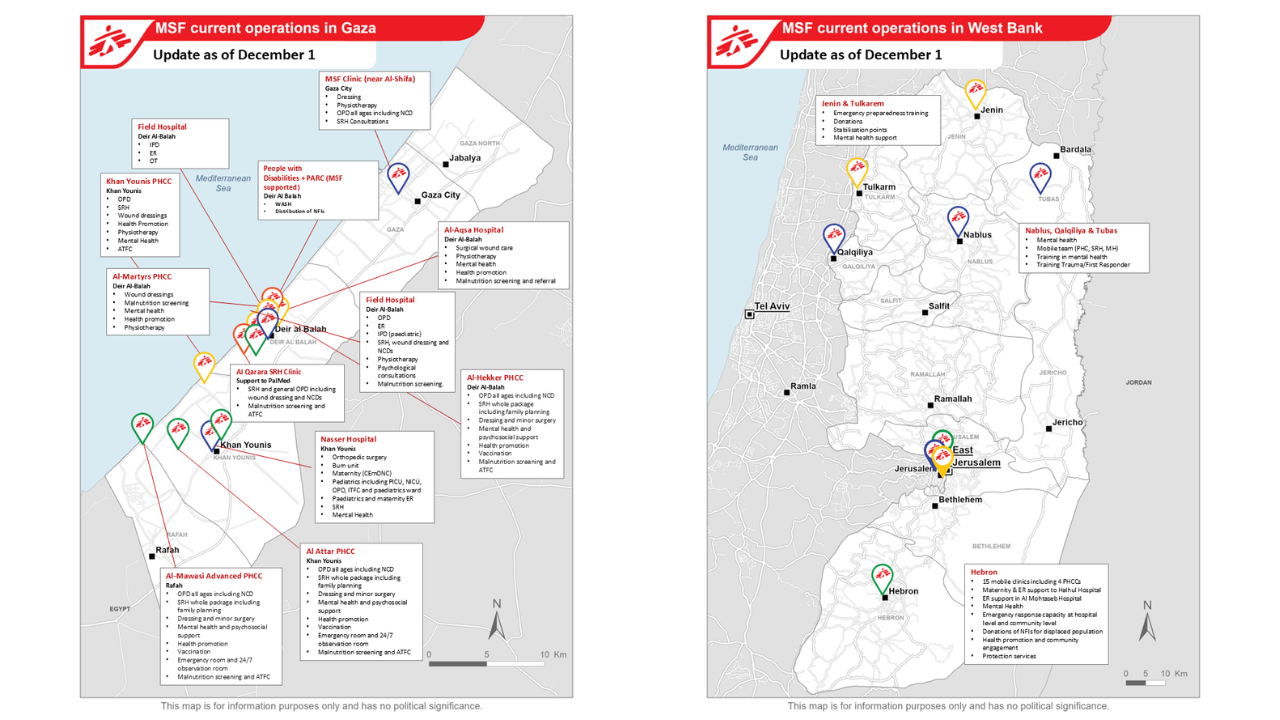
How Doctors Without Borders is responding
As of 10 December 2024
Doctors Without Borders remains committed to providing medical care in Gaza. Our teams currently work in two hospitals, two field hospitals, and seven healthcare facilities. and eight healthcare facilities.
Our teams are offering surgical support, wound care, physiotherapy, maternity and paediatric care, primary health care, vaccination, and mental health services, but sieges and evacuation orders on various hospitals are pushing our activities towards ever-smaller territory and limited response. Doctors Without Borders teams are also providing water distribution.
In the North, Doctors Without Borders has a clinic close to the Al-Shifa hospital premises. The clinic has been damaged, the fence destroyed, and all the windows broken. Since then, Doctors Without Borders has repaired the clinic and the activities have re-started. The team focuses on wound dressings and physiotherapy.
Currently the team focuses on wound dressings and physiotherapy, but we are progressively scaling up the activities to provide more comprehensive services (sexual and reproductive health, general consultation, non-communicable diseases, malnutrition screening).
In the Middle Area, we are working in Al-Aqsa hospital in Deir Al-Balah. In February, we resumed wound and rehabilitation care, and the team has been providing acute trauma surgery, advanced wound care, post-operative wound care, physiotherapy, health promotion and mental health support since then. Access to the pharmacy store has also been re-established.
Our team also provides wound care and malnutrition screening activities in Al-Martyrs Primary Healthcare Centre (PHCC).
In mid-April, Doctors Without Borders opened a new PHCC in Al Hekker to provide outpatients services, including general consultations, vaccination, reproductive health services, dressing, mental health services including psychological first aid, individual and family sessions, and psychoeducation and health promotion activities.
In end-August 2024, in response to the destruction of Gaza's health system, Doctors Without Borders teams, in collaboration with the Ministry of Health, have opened a field hospital in Deir Al Balah. The facility includes an Emergency Department, Outpatient and Inpatient services, and an operating theatre, with a capacity of 49 beds.
And in early September 2024, we opened another field hospital in Deir Al Balah. The field hospital offers outpatient services, including general consultations, follow-ups for non-communicable diseases, sexual and reproductive healthcare (including support for sexual violence cases), wound care, physiotherapy, psychological consultations, and malnutrition screening. Additionally, we provide pediatric inpatient care with a capacity of 69 beds.
In the South, we are supporting more healthcare facilities. Nasser Hospital is the main surgical centre in the south of the Gaza Strip, located in Khan Younis, and the first largest in the whole Strip as now Al-Shifa is not functioning anymore. After Israeli troops withdrew from Khan Younis, Doctors Without Borders visited the hospital in April to assess the possibility of resuming activities. In mid-May, in collaboration with the Ministry of Health, Doctors Without Borders relaunched operations in Nasser, focusing on orthopaedic surgery and the burn unit. The maternity, NICU and pediatric ward started on May 25. We are now working in a 68-bed in-patient department. We have opened OPD for wound care (burn and trauma cases) providing dressings and physio sessions. We are also running daycare surgery service (3 days/week) for trauma and burn patients requiring small interventions that need anaesthesia but no hospitalisation for more than one day due to a lack of beds in the inpatient department.
Doctors Without Borders supports mother and childcare in Nasser hospital, including 2 paediatric wards, pre- and post-partum wards, paediatric intensive care unit (PICU) & newborn intensive care unit (NICU), emergency rooms, and mental healthcare. Mid-June, we also opened an inpatient therapeutic feeding centre (ITFC) for malnourished children. Nasser’s maternity is one of the few functional maternities in the South of Gaza.
Since end of January 2024, at Al-Mawasi Advanced PHCC in Rafah, Doctors Without Borders staff provide outpatient services such as general and paediatric consultations, vaccinations, reproductive healthcare, wound care, minor surgery, mental health support, and health promotion. The PHCC features a 24/7 emergency room for stabilizing and referring severe cases, as well as malnutrition screening and an ambulatory feeding treatment center for children and pregnant or lactating women.
Khan Younis PHCC opened on May 6. Doctors Without Borders provides outpatient consultations, vaccination, mental health, ambulatory therapeutic feeding centre (ATFC), maternal and reproductive healthcare, wound care and physiotherapy, and health promotion. Given the massive influx of population from Rafah into an already packed humanitarian zone, and the lack of health facilities to cover trauma needs, we have recently expanded to include a lightweight emergency service focused on stabilising and referring more complex cases while managing simpler cases in November 2024.
In mid-June 2024, Al Attar PHCC, located between Al Mawasi and Khan Younis, was opened to address the needs of the local population who have set up tents in the area. We offer different services, such as general medicine, paediatric consultations, emergency healthcare and wound care, antenatal and postnatal care, mental healthcare, health promotion, and other services based on our teams’ capacities and population needs.
At Al Qarara Sexual and Reproductive Health clinic in Khan Younis, Doctors Without Borders is supporting PalMed with medications, incentives, and operational funding to provide sexual and reproductive healthcare, general medical services, and malnutrition screening. In November 2024, services expanded to include an ambulatory feeding program for children under five and pregnant or lactating women.
Water and sanitation
In November 2024, Doctors Without Borders has distributed 732,000 litres of water per day through desalinisation process in more than 64 water points in Al Mawasi, Khan Younis, Rafah, and Deir El Balah. We are continuously working to increase this quantity, as drinkable water is a scarce source.
Since February 2024, through partnership with PARC - Agriculture Development Association, Doctors Without Borders is implementing water and sanitation activities in camp shelters in Deir Al Balah and Khan Younis. This includes building latrines for more than 30,000 people located in 6 camps, hygiene kits distribution for 2,400 families, and equipping a camp hosting 70 families (400 people) of people living with disabilities with the needed sanitary facilities (accessible latrines and showers).
Suppy and logistics
As of end of June 2024, Doctors Without Borders has brought seven cargos, a total of 73 trucks, into Gaza through United Nations. Rafah crossing point, formerly the main functional entry point for humanitarian actors, has been closed since early May. This has led to massive queues of trucks and perilous delays in the delivery of humanitarian assistance across Gaza.
On a monthly basis, we are able to deliver medical supplies, including medicines, surgical kits, logistical items and humanitarian aid. It consists of one chartered plane and a small amount of locally purchased items. However, bringing supplies into Gaza has been extremely difficult due to administrative barriers, movement restrictions and lack of crossing options.
- What is happening in the West Bank?
Violent clashes have been breaking out between Israeli forces and settlers and Palestinians in various locations, particularly in Jerusalem, Hebron, Nablus, and Ramallah. As of 23 October, 94 were killed and 1,700 wounded since the conflict started on 7 October. Israeli armed forces announced the West Bank as a closed area. Checkpoints remain closed and workers are not allowed to cross to Israel. Work permits of Palestinians were suspended, and many were ordered to leave Israel. Our team in Hebron is in contact with the Ministry of Health and hospitals in the West Bank to assess their needs daily.
In the meantime, we’re preparing some donations to deliver to health facilities. In addition, we are providing remote mental health support to the population including psychological first aid services and counselling to help reduce stress during this conflict. We’re also in contact with community focal points, for them to raise any major need for us to respond to.
- How is Doctors Without Borders responding in the West Bank?
In the West Bank, we are maintaining activities focused on emergency care, and mental health care in Hebron, Nablus, Tulkarem and Jenin.
Hebron: Our teams are dedicated to delivering medical care through 15 mobile clinics, providing support to four general healthcare centres, implementing and supporting capacity in maternity and emergency room services at Halhoul Hospital, enhancing emergency room capacity at Al Moktaseb Hospital, offering mental health support, conducting capacity building in emergency response, and advocating for and protecting individuals in need.
Our mental health services including psychological first aid, counselling and psychotherapy continue to be offered to people, including a hotline system for people in need of medical, mental health or social services, who can be referred to the appropriate facility.
Our teams have progressively expanded our response to provide healthcare to people who are unable to reach medical facilities. Since October 2023, Doctors Without Borders has expanded its response to 15 mobile clinics covering the areas outside and inside Hebron's old city, but also in the remote villages of Masafer Yatta in the southern West Bank.
We have provided donations of medical equipment and kits to various hospitals, training to community focal points in Beit Omar, Al Fawwar camp, Al Arroub camp, Al-Rshaydeh, and Um El-Khair. We’ve also provided training for staff in Al Mohtaseb, Halhul, Dura, and Yatta Hospital in Hebron.
In addition to the expansion of medical activities since 7 October, our teams have increased health promotion activities in the community, and the distribution of relief items, hygiene kits and food parcels to displaced Gazans, and West Bank residents affected by violence and forcible displacement.
Nablus: Psychological therapy, sexual and gender-based violence (SGBV) case management and psychological consultations are being conducted in Nablus, Qalqiliya and Tubas despite the intensified movement restrictions by Israeli forces since October 2023. Starting from July, Doctors Without Borders provides primary health care with mobile teams in 6 identified locations supporting the existing PHCC.
Our teams provide training to volunteers from the Palestine Red Crescent Society (PRCS) volunteers as first aid providers and first responders in the governorates of Nablus, Tubas, and Qalqilya, also to doctors and nurses in the emergency room in three different hospitals (Nablus, Tubas and Qalqilya), to increase the capacity of Ministry of Health staff to respond to trauma cases.
Jenin & Tulkarem: Doctors Without Borders team in Jenin and Tulkarem continue providing capacity building to first responders, including volunteer paramedics and the community to stabilise patients during active hostilities in case ambulances are not able to reach them in Jenin, Tulkarem and Nur Shams refugee camps.
In the refugee camps of Nur Shams in Tulkarem and Jenin Camp, we donated first aid bags to volunteer paramedics to stabilise patients during active hostilities and keep them alive until they reach the hospitals.
- Does Doctors Without Borders have staff in Gaza? What’s their situation?
All Doctors Without Borders international staff unable to leave Gaza since 7 October have successfully crossed the Egypt border via the Rafah Crossing. A window has been negotiated to allow for foreign passport holders and international aid workers to cross.
On 14 November our team of 15 international staff entered Gaza. On 16 November, they started supporting Palestinian surgeons who have been treating on average 9 to 10 mostly burn cases per day.
As for our Palestinian staff, it is currently difficult to verify the situation of all our 300 colleagues. We know that some of them are currently trying to leave for the south with their families. Doctors Without Borders is trying to help them find shelter. Others, notably medical staff, remain in the north and continue to treat the sick and wounded. We do what we can to remain in contact with them.
- What is Doctors Without Borders doing in Palestine prior to the 7 October conflict?
In the Palestinian Territories, Doctors Without Borders provides medical and psychological assistance to people affected by the long-term conflict since 1989. In Gaza, our teams work in three hospitals and several outpatient clinics, offering comprehensive care for people suffering from burns and trauma, which includes surgery, physiotherapy, psychological support, occupational therapy, and health education. Since 2018, Doctors Without Borders has been running a reconstructive surgery program in northern Gaza.
- Is Doctors Without Borders providing medical care in Israel?
We are a humanitarian organisation, which means we treat everyone who needs help, but our resources are not unlimited: we focus them where they are needed the most. We do not currently run medical programs in Israel. However, we are taking every available opportunity to send fresh humanitarian supplies into the Strip, where healthcare facilities urgently need them. The Palestinian healthcare systems, both in the West Bank and the Gaza Strip, have been crippled by over 70 years of occupation and over ten years of blockade. They are unable to meet the basic health needs of their respective populations. In contrast, Israel has an excellent healthcare system and has not requested support from Doctors Without Borders at this time.
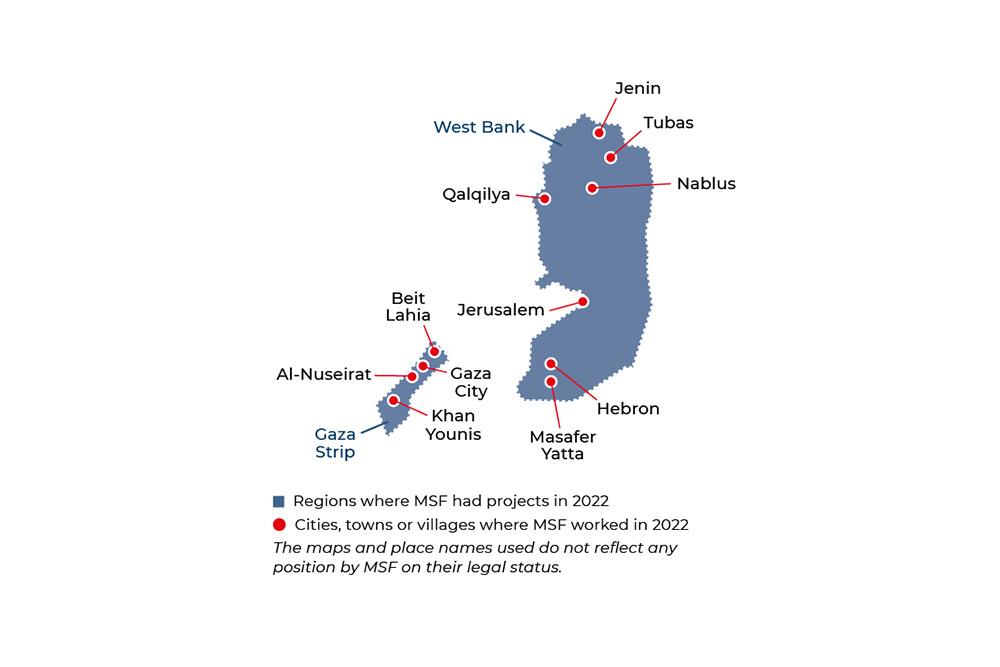
Scroll through the conflict timeline
Support our emergency response work
Our medical teams are on the ground treating patients. You can help them provide lifesaving medical care by making a donation today.
